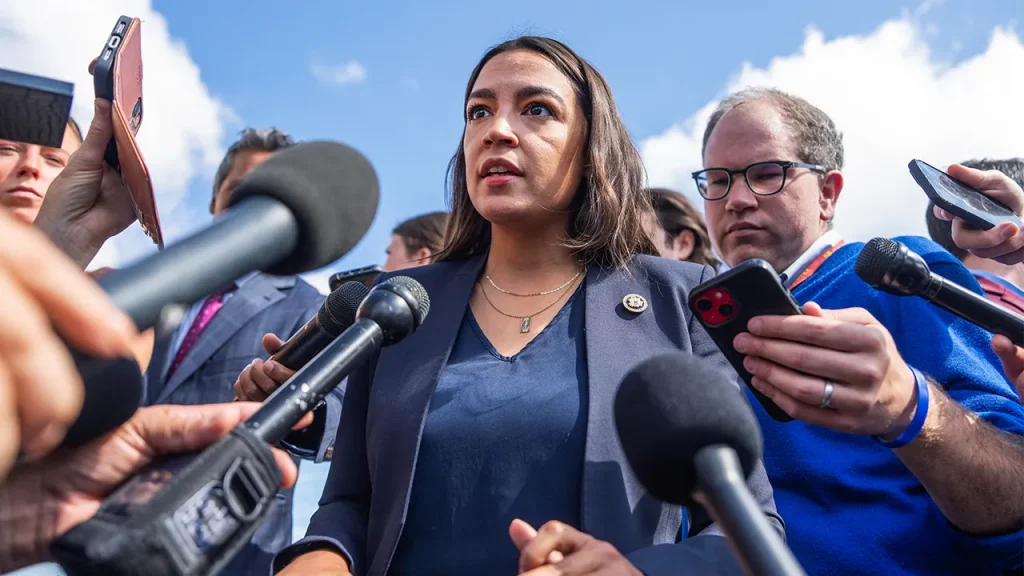Democratic Divide: The Fallout from Ending America’s Longest Government Shutdown
The recent end to America’s longest government shutdown has exposed deep fractures within the Democratic Party, revealing a growing rift between establishment leadership and the progressive wing. After 43 days of political standoff, several Democrats broke ranks to support a funding deal that reopened the government but left key healthcare priorities unresolved—particularly the extension of pandemic-era Obamacare subsidies. This decision has sparked fierce criticism from progressive voices like Rep. Alexandria Ocasio-Cortez, who publicly questioned whether the prolonged shutdown had achieved anything meaningful. “We have federal workers across the country that have been missing paychecks. We have SNAP recipients, millions of SNAP recipients across the country whose access to food stability was imperiled, and we have to figure out what that was for,” Ocasio-Cortez remarked, adding pointedly, “We cannot enable this kind of cruelty with our cowardice.”
The fallout has been particularly visible among Democrats running in upcoming midterm elections, who see the concession as a betrayal of core party values around healthcare access. Tennessee congressional candidate Aftyn Behn, described as the “AOC of TN,” declared that the shutdown’s conclusion proved “we need a new generation of leadership in Washington,” directly criticizing the “career politicians” who yielded without securing a commitment from House Speaker Mike Johnson for a vote on ACA subsidies. Similarly, Saikat Chakrabarti, Ocasio-Cortez’s former chief of staff now running for Nancy Pelosi’s seat in San Francisco, called for wholesale leadership change: “After 40 days of holding firm, with public opinion and momentum on our side, establishment Democrats decided to cave to Trump. Schumer and the entire democratic leadership need to step down—and if they run for re-election, we need to primary them.” These reactions highlight how healthcare has become not just a policy disagreement but a litmus test for progressive Democratic identity.
Some progressive candidates are using this moment to push for even more ambitious healthcare reforms. Dr. Abdul El-Sayed, a progressive Senate candidate in Michigan known for his Medicare for All advocacy, argued that Democrats shouldn’t limit their healthcare fight to ACA subsidies: “It HAS TO BE bigger. Too many Americans are suffering over medical debt and spiraling costs. It should be nothing short of Medicare for All.” He expressed that Americans should be “spitting mad about a few Senate Dems capitulating as health insurance premiums skyrocket for 25M people.” New York City Mayor-elect Zohran Mamdani similarly urged Democrats to reject the reopening deal, arguing that it “dramatically hikes healthcare premiums and only exacerbates the affordability crisis.” This chorus of criticism reflects a fundamental tension between pragmatic governance and ideological principles within the Democratic coalition.
The internal conflict extends to sitting members of Congress as well. Representative Ro Khanna of California delivered perhaps the most direct challenge to leadership, stating that Senate Minority Leader Chuck Schumer is “no longer effective and should be replaced,” and questioning, “If you can’t lead the fight to stop healthcare premiums from skyrocketing for Americans, what will you fight for?” Meanwhile, House Minority Leader Hakeem Jeffries attempted to redirect blame toward Republicans, characterizing their approach as “my way or the highway” and warning of continued “challenges governmentally” if the Trump administration maintains this stance. The disagreement has real-world implications beyond political positioning—funding for the Supplemental Nutrition Assistance Program (SNAP) expired on November 1st, threatening food access for millions of low-income Americans who depend on these benefits during an already precarious economic period.
Despite the criticism, some Democrats defended the shutdown as a necessary fight even without achieving all their objectives. Representative Shomari Figures of Alabama framed healthcare access as “more than just a talking point” in his state, which struggles with low life expectancy rates and limited hospital access. “Protecting health care for us is a requisite,” Figures asserted. “It’s a requirement. It’s something we have to do. And if you ask us if the shutdown was worth it, I say, hell yes, it was worth it. Because fighting to maintain healthcare for American people, there’s nothing more pure than that.” His perspective underscores the regional variations in how Democrats view healthcare priorities, with representatives from states with poorer health outcomes potentially seeing the issue with greater urgency than those from areas with more robust healthcare systems.
The progressive “Squad” members have been particularly vocal in their condemnation. Representative Ilhan Omar called the Senate’s deal a “betrayal of working people and a sham,” while emphasizing that “the public rightly recognizes that Trump and Congressional Republicans are to blame for the longest government shutdown in history.” Senator Bernie Sanders, a longtime Medicare for All advocate, criticized Trump for being “willing to see children go hungry to make a political point.” Perhaps most tellingly, Ocasio-Cortez suggested this wasn’t just about individual leaders but represented a broader “reflection of the party” itself. As Democrats look toward future legislative battles and election cycles, this episode highlights the challenging balance between achieving practical governance outcomes and maintaining progressive principles—a tension that seems likely to define the party’s internal dynamics for years to come. The resolution of the shutdown may have temporarily reopened the government, but it has opened much deeper questions about Democratic Party identity and leadership.















